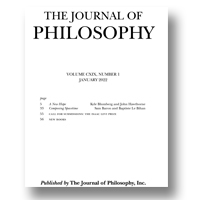|
1.
|
The Journal of Philosophy:
Volume >
119 >
Issue: 10
Jared Warren
Inferentialism, Conventionalism, and A Posteriori Necessity
abstract |
view |
rights & permissions
| cited by
In the mid twentieth century, logical positivists and many other philosophers endorsed a simple equation: something was necessary just in case it was analytic just in case it was a priori. Kripke’s examples of a posteriori necessary truths showed that the simple equation is false. But while positivist-style inferentialist approaches to logic and mathematics remain popular, there is no inferentialist account of necessity a posteriori. I give such an account. This sounds like an anti-Kripkean project, but it is not. Some of Kripke’s remarks even suggest this kind of approach. This inferentialist approach reinstates neither the simple equation nor pure conventionalism about necessity a posteriori. But it does lead to something near enough, a type of impure conventionalism. In recent years, metaphysically heavyweight approaches to modality have been popular, while other approaches have lagged behind. The inferentialist, impure conventionalist theory of necessity I describe aims to provide a metaphysically lightweight option in modal metaphysics.
|
|
|
2.
|
The Journal of Philosophy:
Volume >
119 >
Issue: 10
Michael Townsen Hicks
Counterparts and Counterpossibles: Impossibility without Impossible Worlds
abstract |
view |
rights & permissions
| cited by
Standard accounts of counterfactuals with metaphysically impossible antecedents take them to by trivially true. But recent work shows that nontrivial countermetaphysicals are frequently appealed to in scientific modeling and are indispensable for a number of metaphysical projects. I focus on three recent discussions of counterpossible counterfactuals, which apply counterpossibles in both scientific and metaphysical modeling. I show that a sufficiently developed modal counterpart theory can provide a semantics for a wide range of counterpossibles without any inconsistent possibilities or other forms of impossible worlds. But such a view faces problems: in order for the metaphysical views I discuss to bear weight, there must be a significant difference between the metaphysical possibilities and impossibilities. I will show how the counterpart-theoretic view delineates the possible from impossible, while still making room for the impossible.
|
|





